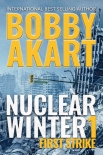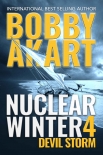Nuclear Winter First Strike Bobby Akart (children's ebooks free online .txt) 📖

- Author: Bobby Akart
Book online «Nuclear Winter First Strike Bobby Akart (children's ebooks free online .txt) 📖». Author Bobby Akart
“Do you think he’ll fire on us?”
“Not necessarily. The war planners feel he could take a shot at Seoul. If he does, we’ll have to defend South Korea. That will necessarily result in an escalation that might bring in …” Her voice trailed off, so Peter completed her sentence.
“China,” he said just above a whisper. “Jenna, this is crazy out of control. Can’t they find a way to tamp all of this down?”
“Maybe. The president is conferring with the secretary of state this afternoon. The United Nations is one option. Moscow is another, if you can believe that.”
“What? Seriously? Why would they step in?”
“One, they have a lot of nukes pointed at us. While they tend to lean toward China from a geopolitical standpoint, they recognize the damage that would be caused by Washington and Beijing duking it out. There’s a belief in this building that Russia could convince cooler heads to prevail.”
Peter shrugged and shook his head. “That’s a long shot.”
“It is. The other pressure is from the UN, but they’ve had little influence over North Korea in the past.”
“Bribery,” quipped Peter. North Korea was notorious for demanding a king’s ransom from world powers for the mere promise of behaving like a civilized nation. It had always worked. For a while.
“Yes.” Jenna glanced at her watch. “I’m sorry. I don’t have much time. I need to meet with the rest of the communications team as we divide up our responsibilities. Others are being dispatched to Cheyenne Mountain and Mount Weather.”
Peter looked glum. “I know. You gotta go.”
Jenna spontaneously hugged and kissed him. They’d always made a point to avoid public displays of affection since they were technically on opposite sides of the podium.
Peter hugged her back, and they held their embrace for nearly a minute. Then, with a final kiss, a goodbye, and a promise to be safe, the two parted ways. One left for the safety of a hardened nuclear bunker. The other for his condo, his mind full of conflict as to what he should do.
Part VII
One Week in October
Day seven, Thursday, October 24
Chapter Forty-Six
Thursday, October 24
Mount Weather Emergency Operations Center
Northern Virginia
The 2008 Democratic primary campaign advertisement had been deemed one of the best in modern history. The scene, ominous, if not creepy, began in the middle of the night. It was 3:00 a.m. Sleeping children. A ringing telephone. The undertone of a matter of grave importance in the narrator’s voice. It was a who-do-you-want-in-charge, Cold War-esque display asking voters whom they trusted to lead the country during a world crisis when that phone rang in the middle of the night.
Every president had their three-in-the-morning phone call moment. This was President Carter Helton’s. Ironically, just after 3:00 a.m.
He was awakened by his chief of staff, and he hurriedly dressed in a pair of Penn State University sweats. There was no time for decorum, as nuclear weapons had been launched once again.
North Korea had been relatively quiet throughout the exchange of ballistic missiles in South Asia. In the past twenty-four hours, that had changed. During the DPRK’s 13th Party Congress, Kim did a lot of chest-puffing. Apparently, he was prepared to follow through on his threats.
Most analysts believed if a second Korean war broke out with the use of nuclear weapons, it would be deadly, producing millions of deaths just in the South Korean capital of Seoul. However, if North Korea deployed their nuclear arsenal toward Japan as well, countless more millions would die.
Following the war handbook developed by Russia, the North Koreans had amassed troops and accompanying military assets on the border with South Korea in a show of force. Many thought they were feigning an invasion in an attempt to gain concessions at the UN bargaining table.
Then, mere minutes ago, they fired two nuclear-tipped ICBMs into South Korea. The first was successfully destroyed by the U.S. Aegis ballistic missile defense system located in Japan. The second warhead struck the heart of Seoul, vaporizing a million South Koreans instantly.
Seconds after the Aegis missiles were fired from Japanese soil, Kim turned his sights on Tokyo. He immediately declared war on Japan and initiated the launch sequence. Within minutes, three ICBMs were launched from missile silos on the east coast of North Korea toward Japan.
Tokyo’s population of nine million plus lived in one of the highest density cities in the world. Two of the three ICBMs found their marks, devastating the city, including the famed Imperial Palace. Once again, the Aegis defense system worked, but with only marginal success.
Kim wasn’t through yet. He saw the use of the U.S. built and maintained Aegis system being deployed against his nuclear arsenal as being tantamount to Washington declaring war on Pyongyang. He chose to ignore the defensive nature of the Aegis deployment.
He fired four ICBMs across the Pacific toward the West Coast of the United States and one toward Hawaii in rapid succession. Their estimated time of arrival was half past the hour of three in the morning. They were followed by a second wave of three more ICBMs that followed a different path over the Arctic Circle toward East Coast targets.
The U.S. missile defense system was a global network with twenty-four-hour surveillance by land, sea, and space-based sensors, all of which were constantly looking for signs of anything amiss in North Korea. Regional missile interceptors were deployed in Japan, South Korea, Guam and on U.S. Navy ships, while military bases in Alaska and California were equipped to intercept missiles headed toward the United States.
When North Korea launched their missiles, U.S. satellites detected them almost instantaneously through infrared signals. In less than a minute, the satellites raised the alarm, and the command-and-control center at Schriever Air Force Base near Colorado Springs, Colorado, sprang into action.
Minutes later, President Helton entered the operations center at Mount Weather. Thus far all decisions made in the defense of South Korea and Japan had been made by pre-established protocols and programmed responses. The same




Comments (0)